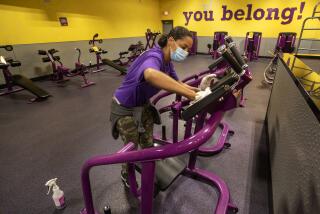Sick? Skip that workout -- seriously
- Share via
Far be it for die-hard fitness buffs to let a little fever stop them from doing their regular workout -- or for driven Pop Warner football players to miss a practice. But it’s not actually laudable to laugh in the face of an illness such as the H1N1 virus.
“The best information we have says complete bed rest is best,” says David Nieman, director of the human performance lab at Appalachian State University in Boone, N.C. And forget the idea you can sweat out the flu through intense exercise: “That’s a myth,” he says. “A big myth.”
Working out, especially at a vigorous pace for a long stretch, may do more harm than good.
“We know that heavy exertion causes a transient downturn in immune function that can last from a few hours to a day,” says Nieman, a professor of health and exercise science. During heavy, prolonged physical exertion, he adds, stress hormone levels such as cortisol rise, causing immune cells to function less efficiently. “During this downturn, if you have a virus, it will multiply at a higher rate and make you sick.”
In research published in the journals Sports Medicine and Medicine & Science in Sports & Exercise, Nieman has found that immune function is compromised among marathoners after a long race. They’re simply not as effective as people who haven’t overexerted themselves at fighting off invading viruses.
Although much of the data in the area of exercise and viruses have been done on animals, Nieman says even those show that -- when dealing with a systemic virus with symptoms of general fatigue, aches and pains -- rest is necessary. “If any level of exercise is engaged in,” he says, “you risk making the illness more severe.”
--
The fever factor
Raising body temperature may be chancy as well, he adds. “It makes physiological sense. If your core temperature is already up and you dare to add to it, you have to keep in mind that viruses like to multiply with higher body temperatures. Everything is multi-factorial, and that may be one factor.”
Common sense is always a good rule to follow when it comes to being sick, but not everyone subscribes to that. Nieman says he was training for a marathon when he got a mild flu. The day after his fever broke, he ran, only to be slammed with symptoms again. “I completely relapsed,” he says. “It was dumb. I knew all this stuff, but that’s what drives a lot of athletes, that need to get back into the race.”
Dr. Peter Katona isn’t completely anti-exercise for those who may be dealing with a virus but cautions regular exercisers to heed what their bodies are telling them. “If you feel up to it, you can do some light working out, like stretching,” says the associate professor of clinical medicine at UCLA who specializes in infectious diseases. “Do things that aren’t going to give you a lot of sweat and fatigue. Don’t push yourself, but let your body be your guide.” And stay home -- don’t go to the gym to exercise and spread the infection.
Doing too much, he adds, may put people at risk for injury. “You might be weaker than you realize,” he says.
Once you feel better, however, remember that regular moderate exercise may boost the immune system.
A small study published in Medicine & Science in Sports & Exercise in 2003 found that immune function improved in adults over age 65 who did moderate exercise three times a week as compared to a control group that didn’t change its exercise habits. Both groups received a flu vaccine at the beginning and end of the study. After the first vaccine, the groups showed no difference in antibody concentration and function of cytoxic T cells, white blood cells that can kill virus-infected cells. After the 10-month exercise program and following the second vaccination, the exercise group showed a greater antibody concentration and cytoxic T cell function than the control group.
--
Better response
“One hypothetical way of thinking of it is that repeated exposure to moderate exercise stress can enhance the body’s ability to respond to other stressors such as infection,” says Marian Kohut, lead author of that study and associate professor of immunobiology, kinesiology and gerontology at Iowa State University.
Kohut and others say a good way to prevent the spread of diseases is to wipe down equipment before and after use at the gym. Also, don’t touch the eyes, nose and mouth while on any equipment, since that’s how the virus can be transmitted. And always drink extra fluids during the flu season.
--


